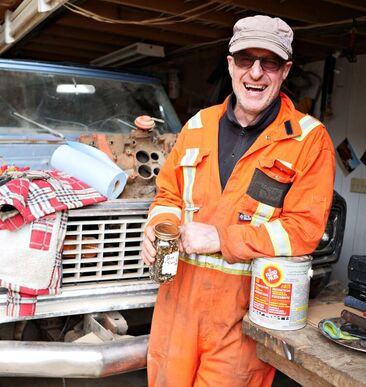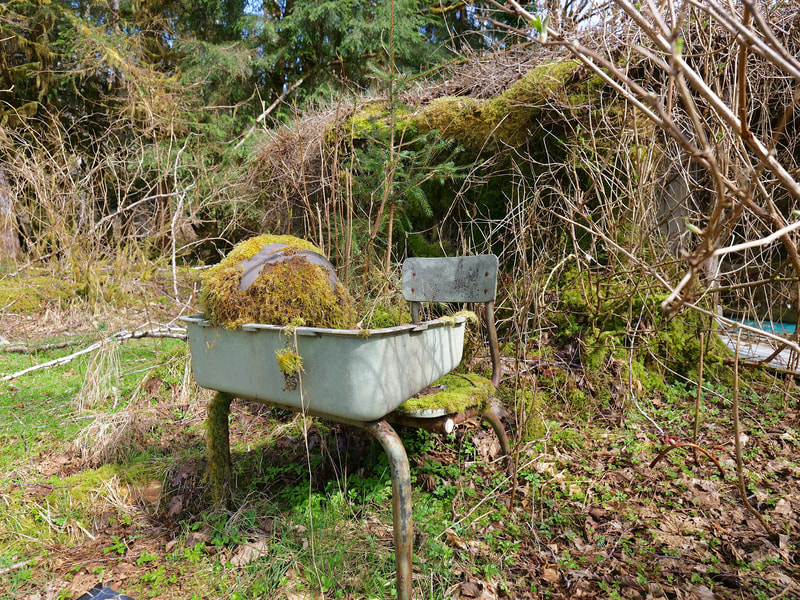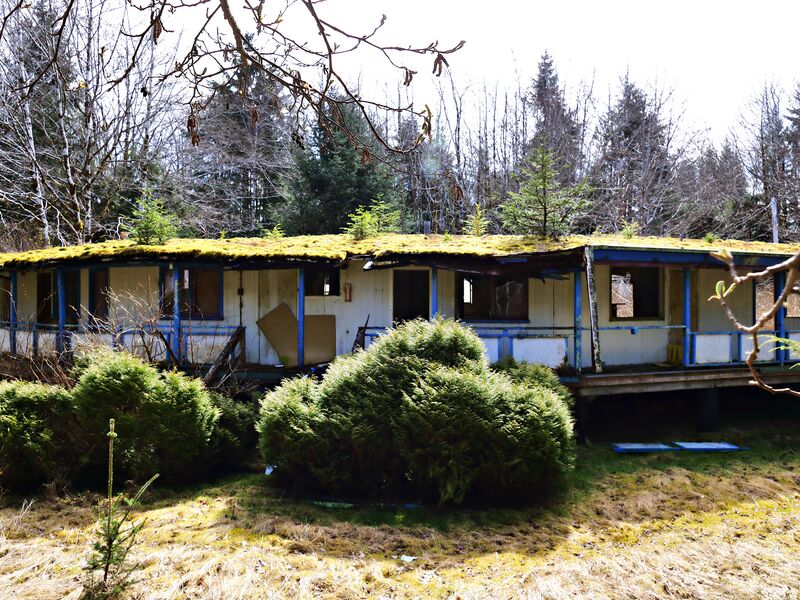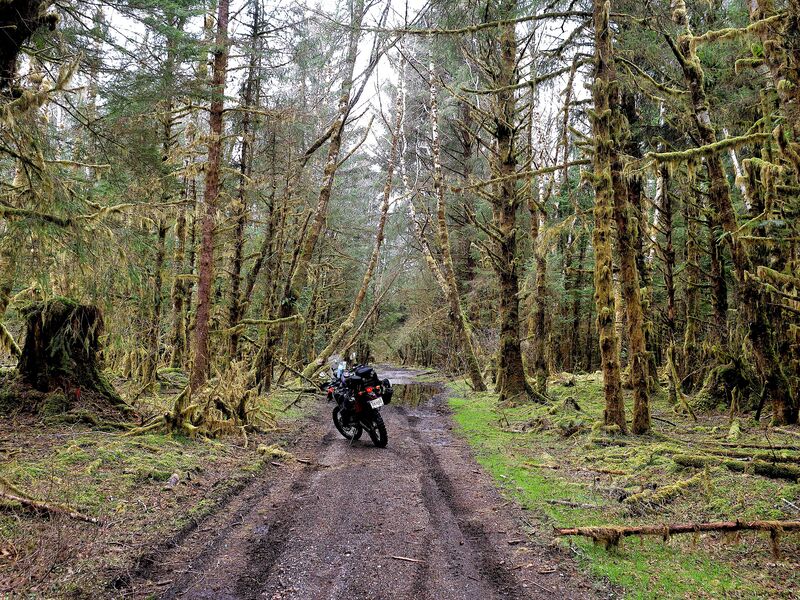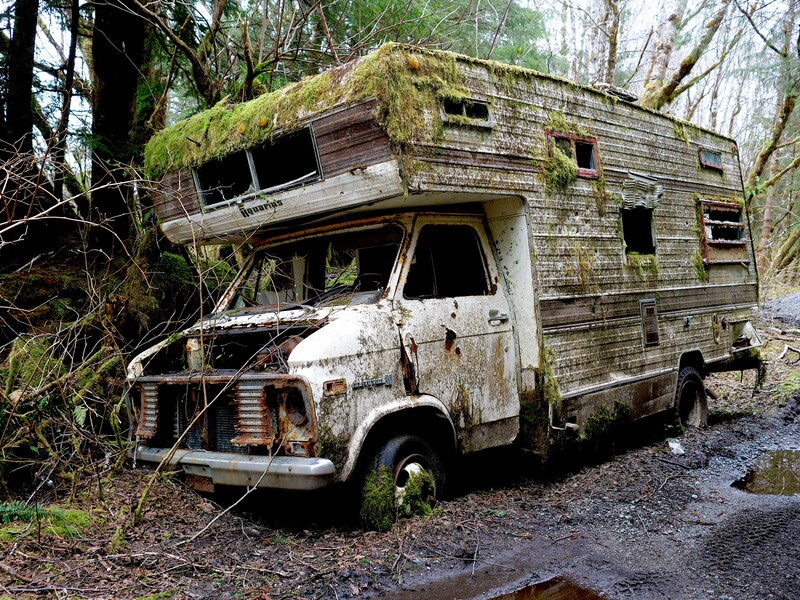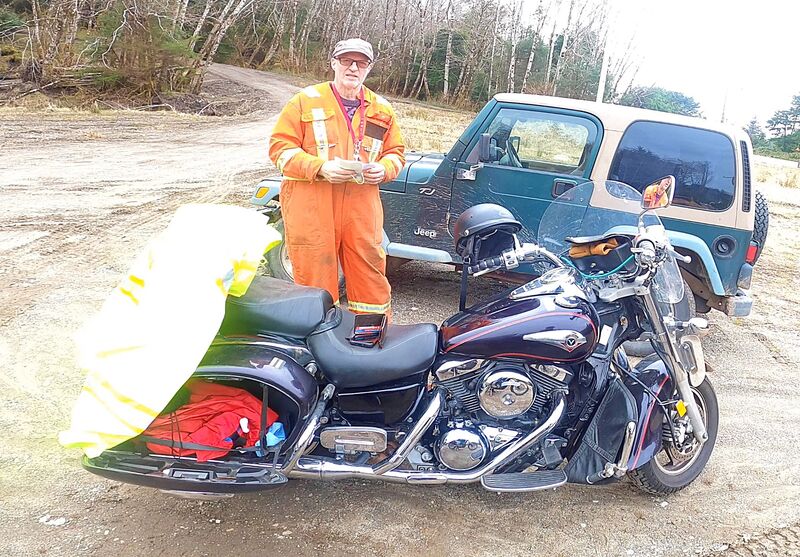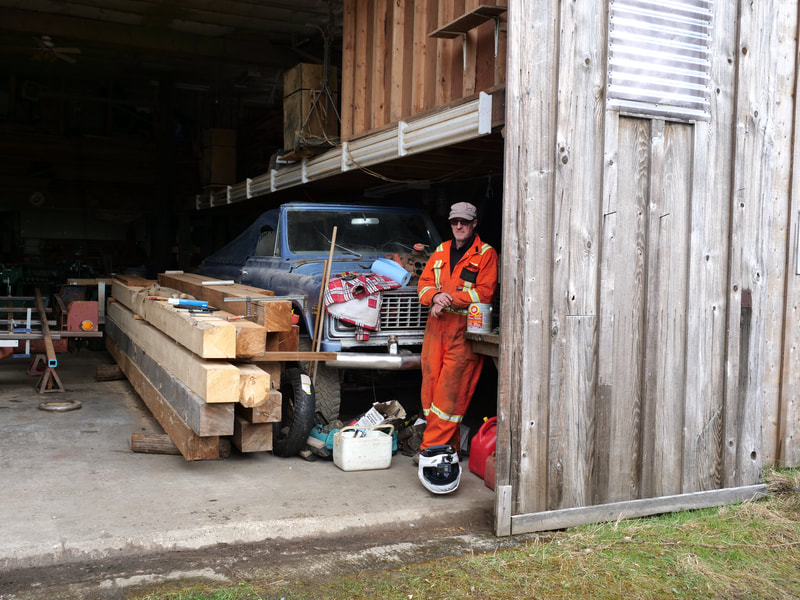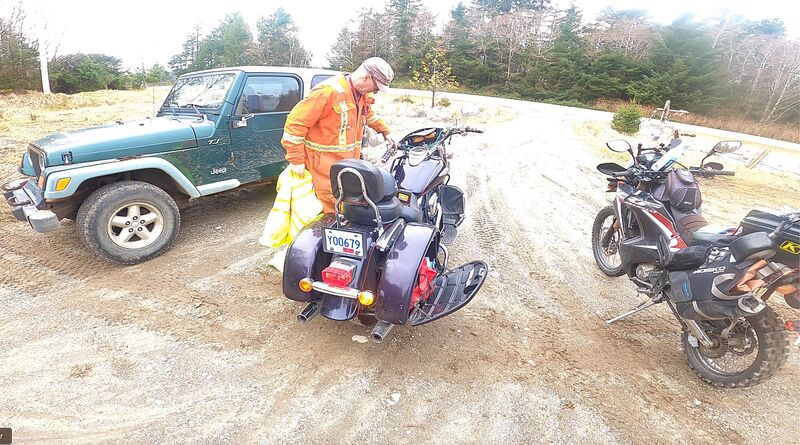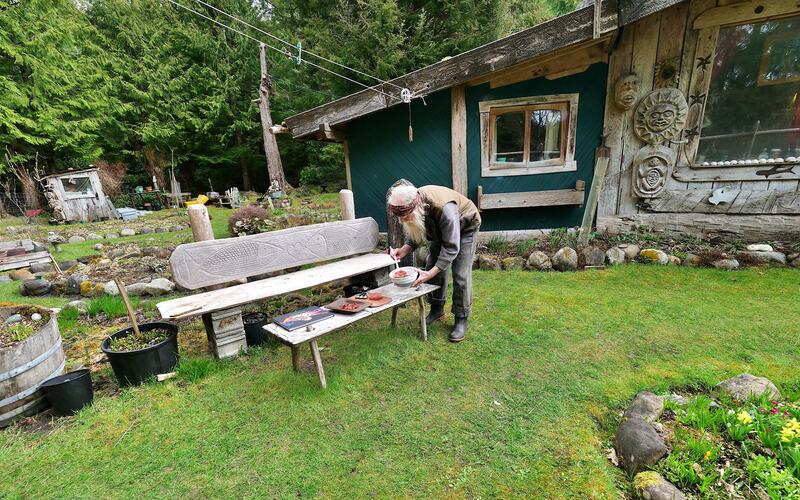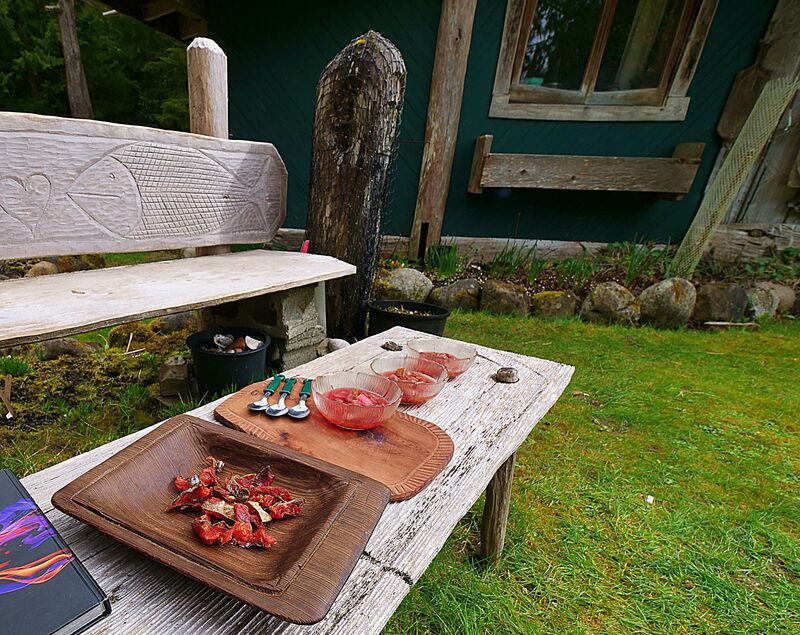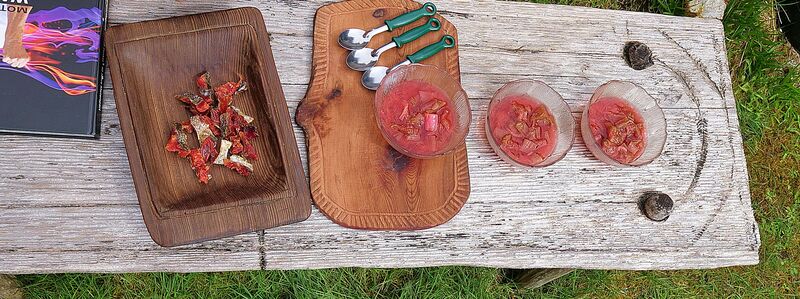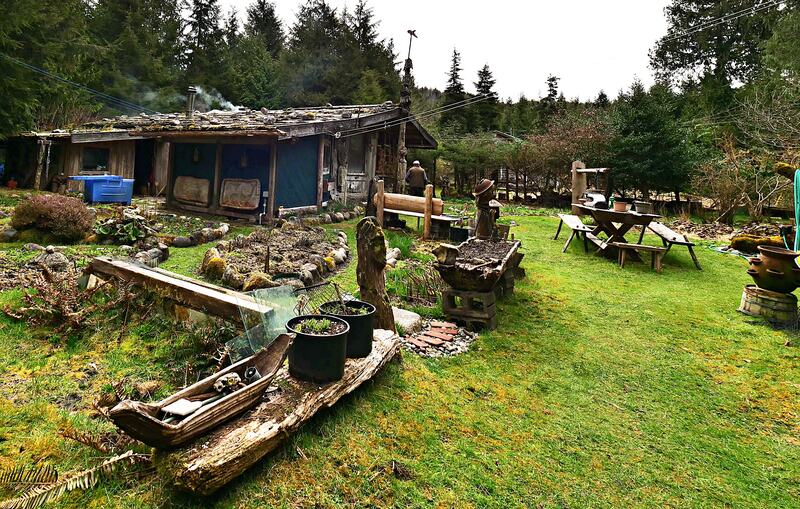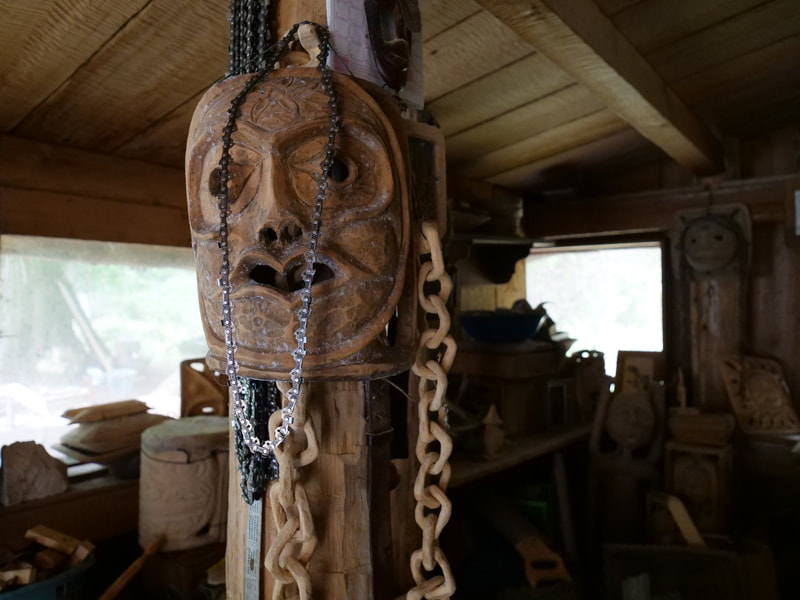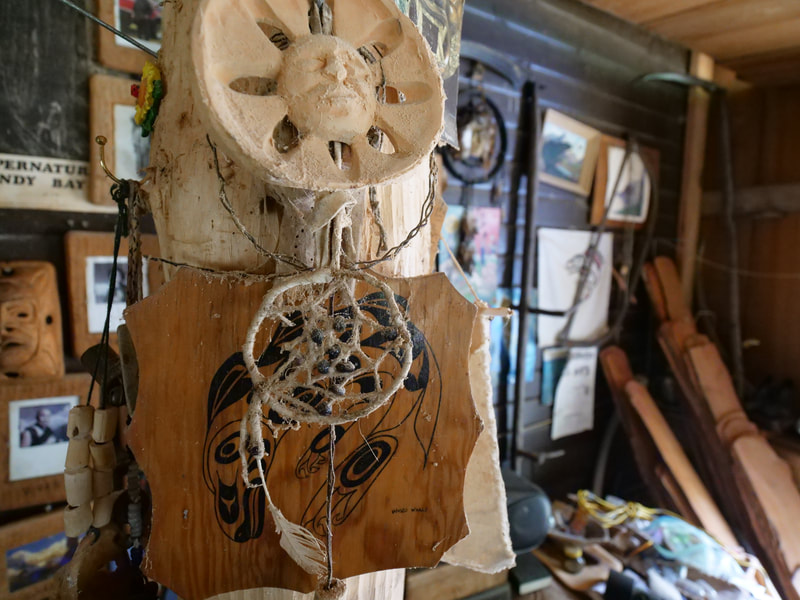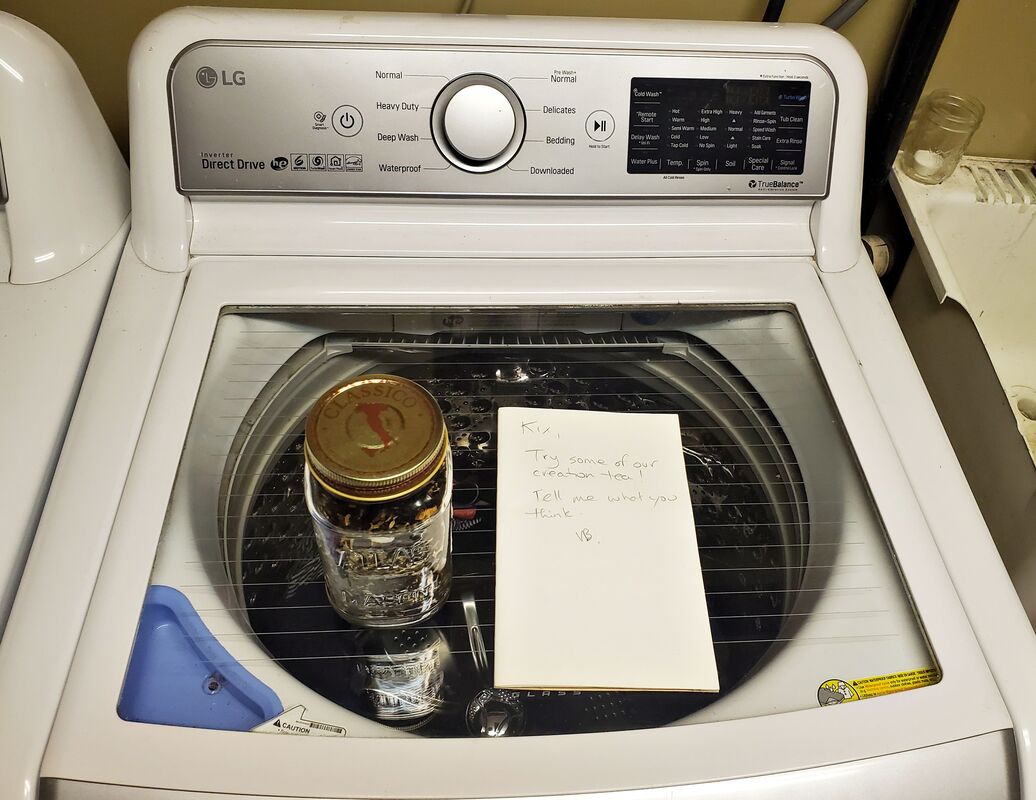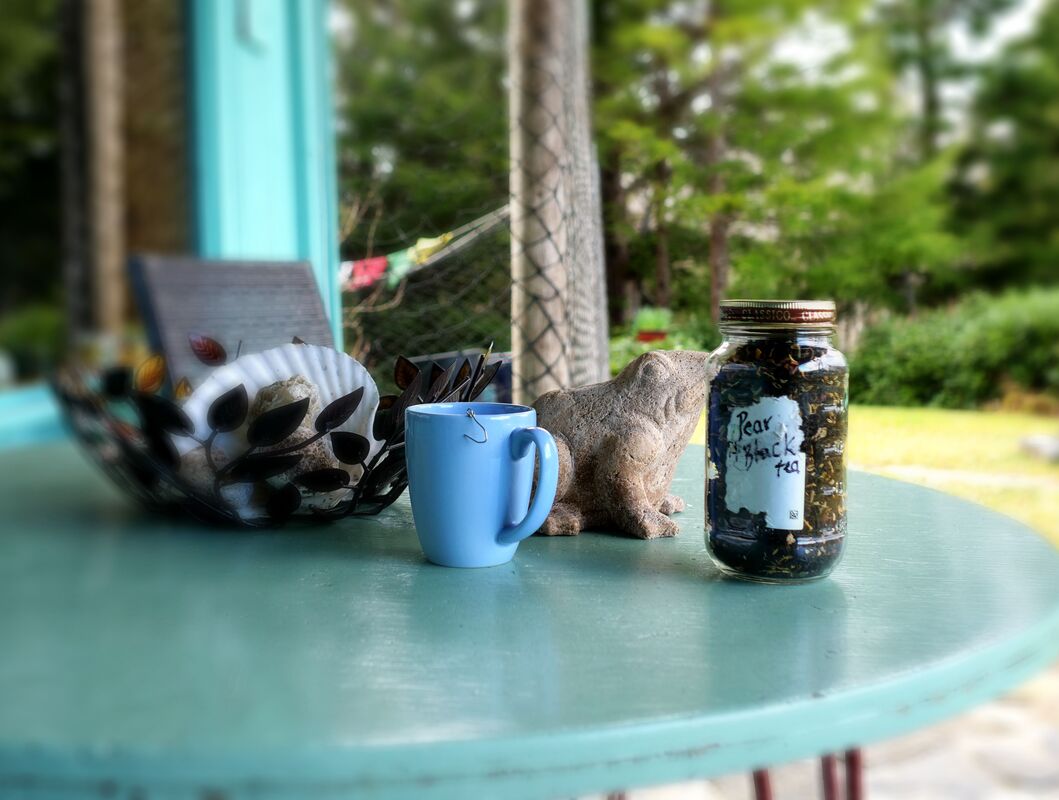Vern's Wildberry & Pear Black Tea With Cedar Smoked Rainwater - Masset, Haida Gwaii British Columbia6/2/2023 Often, great people and great creations seemed to suddenly appear. Or in this case, appear on a basement washing machine with my name on it. “Kix. Try some of our creation tea! Tell me what you think. VB” I booked an island Airbnb, noting to the host I was arriving on a motorbike and was hoping to meet a local who could teach me about Haida food harvesting. The host replied instantly, he seemed excited I was coming on a motorbike and shocked I was coming on a motorbike in April! Apparently, not everyone rides through a week of snow storms to arrive out of season at one of the most beautiful hiking destinations on the West Coast when all the trails are still closed on account of mud and snow. Vernon, the host, replied he had an old food gathering friend with an art studio named Wilfred he’d take me to meet after he got his motorbike insured so he could first take me on a two-wheel tour. I still hadn’t met this guy and he already had me lined up for a personal motorbike tour and an afternoon with one of his good friends. Good to his word, I arrived at his walkout suite perched on a grassy hilltop overlooking the waters of the Masset Inlet and he laid out the plan. Vernon is personable like that favorite uncle everyone has who’s great at throwing parties. It was basically whatever I needed Vernon either had it lined up or knew where to get it. -Are you thirsty? There are a few drinks in the fridge in the suite. -Do you want to see some sights? I put a map downstairs and noted all of the best places to go to in this area. -Interested in a personal tour of this end of the island? I got my bike insured, took it for a test ride, and picked out a few spots to go and people to see. Wow, I’m not this nice to my own company and Vernon only knew me from an Airbnb profile photo where I’m fishing someplace in Patagonia. I unpack and meet Vernon at the bottom of the hill next to his Vulcan Nomad cruiser bike dawning a pair of bright orange overalls with yellow reflective stripes, an open-faced motorcycle helmet, and a pair of leather work gloves. I like this look. Usually, I see $20,000 motorbikes and riders dripping in shiny leathers all lined up outside of Tim Hortons hoping to win the looks and loud pipes contest. Vernons actually ready for adventure and has nothing to prove. An x-woodworking teacher on an island of trees, inhabited by a culture of pole carvers, it feels like the previous life work was well suited for both teacher and students. Supposedly retired, Vernon had more than a dozen or so projects on the go when I showed up. Spread between his one-man lumber mill, a truck he’s fixing, and some trees he’s clearing for a potential expansion. How he had time to entertain me for the day I had no idea, but I wasn’t about to talk him out of it. We hop on the bikes and Vernon takes me down a side road into a small subdivision of Masset, not far from his place. He wanted to show me some of the logs he prepped for a friend who was building a house. The trunks are so massive I could have crawled through them if hallowed out. I asked him how old he thought the tree was. He counts the rings of the tree in a one inch section, then multiples it by the width of the tree from the middle. By rough estimate, he figures this one was over 300 years old! I can’t believe what I’m seeing. In my lifetime assuming I live to be 100 (I’m surprised I saw 40), I would barely witness a third of the growth of this tree. Next a brief town tour, then we are off to Wilfred’s. Parking up the road, there is a treed path down to Wilfred’s where we are eventually greeted by a wall of towering cedars and two large carved faces marking the entrance that have been positioned to keep watch of the property. Through the garden sits a weathered hand-built log home marked with a totem pole. Following the mossy cedar rooftop, a light plum of smoke rolls out from a chimney at the top. Around the corner tucked under a tree next to the cabin is an elderly man straddling a log that's covered with an old deerskin. He greets us while chiseling away at his next project. Wilfred’s been on the island since the 1960s and was hovering around eighty years old at the time. He has a long white beard like a wizard, is thin, but looks healthy and he’s sporting a pair of rolled-down rubber boots and a durable attire of what looked like wool pants and a hand-knit sweater. He appears quite steady as he tears away at the log in front of him with a large chisel and wood mallet. He says hello through a strong Austrian accent while Vernon and him reminisce. My favorite story that day was of a hike they were on years ago to the local Sleeping Beauty Peak in early spring. They had hiked to the top and were planning to ski out. Wilfred had been wearing a deerskin for warmth that was cleaned up except for two of the hoofs. Once at the top, Wilfred took off the deerskin laid it on the snow, grabbed onto the hoofs, and rode it down the hillside in a mad flash of skin and snow faster than anyone could ski it. We all burst out laughing at the site of old Wilfred ripping down the mountainside. Vernon explains that Wilfred grows a lot of his own food, generally harvests the rest, and has a wealth of local knowledge. He tells Wilfred I’m looking to learn about the harvesting of local foods in the area and living off the land, then pitches him the idea of an on-camera interview about it. Wilfred explains that anything anyone had ever wanted to know about harvesting wild foods has already been written and he wasn’t interested in talking to a camera about it. However, he’d serve us a light lunch he’d prepared of local goods. Food over film, I liked his negotiation style. Shifting to some benches he’d whittled, Wilfred made his way inside the cabin returning with a hand-carved dish used to display the smoked sockeye he’d caught and smoked last year as well as three bowls of a sort of sweet rhubarb slurry with no specific name. The rhubarb came from his yard and he’d poached it with cloves and a bit of sugar. The sockeye had been dried and then cut into little strips proportionate to those atop sushi. No salt, no seasoning, and somehow still slightly moist. Both items were delicious and relatively nutritious. The offering outdid any potential interview. Back at the Airbnb, looking at my limited luggage and knowing what it was like to live out of a duffle bag, Vernon offered me the use of his laundry machine. In the morning when I went to gather my goods from the dryer, not only had Vernon folded all nine pieces of clothing I brought on the trip, but he’d also left me a gift on the washer with a note. It was a repurposed pasta jar with the words “Pear Black Tea” written on the side in black felt marker where a label once was. The note beside it; “Kix. Try some of our creation tea! Tell me what you think. VB” Apparently, he has time to make tea too :) Do I want to try the creation awaiting me on the washer next to the 5-star laundry service? Are easter bunnies made of chocolate… On goes the kettle while I rummage through Vernon's kitchen for a tea infuser and cram as much of the creation into the infuser as possible. The boiling water gives off the light scent of smoked cedar, just enough of a scent to let you know the moment is sponsored by Haida Gwaii and not Evian. On the island municipal services don’t reach everywhere and Vernon, like a lot of other locals, catch some of the 4-5 feet of yearly rainfall. To compare, where I live, the average yearly rainfall is closer to 1.5 feet. He also primarily heats his home with cedar logs. Out from the chimney, a steady stream of cedar smoke and little bits of wood and ash will occasionally collect on the tin roof. The steady flow of rain washes some of that into the cistern where it marinates, then the water is then filtered for consumption. Despite the filtration, there is still a light flavor of cedar smoke, and when the water boils it gives off the aroma of a cedar sauna. I’ve been waking up to discount hotel room Red Rose Tea for two weeks now and the cedar smoked pear black tea hits me like one of those chocolate bunny ears after forty days of Lent. It’s sweet like pear sap, and the rest of the mystery fruits round out the flavor like a well-aged fruit wine. The elixir of fragrant scents wanders through my mouth and out my nose like the white plumes of smoke wafting out from Wilfred's chimney in the damp woods. I pack up that day to take the muddy logging roads through the woods to catch the midnight ferry. On the way out I stop at Vernons' mill to say goodbye and ask what was in the tea, thinking it was some mystical creation he’s been testing for years. Vernon looks at me like I asked what goes in a grilled cheese. He chuckles, and says; It’s tea, you put whatever you want in it! Ok, but what’s in this tea I ask? Vernon picks up the jar and shakes it a little. Well, he says, There is some Huckleberry, Salmonberry, a bunch of wildflowers, and basically whatever we found while out harvesting berries. What about the pear I ask? He says the pear was on the counter when they were making the tea, so they dried it out and added it to the mix along with some black tea they’d bought online from a store that was closing. He pauses and then notes there was one special ingredient that his other teas had that this one was missing. Some of the islands' little red strawberries. They are about the size of a pinky nail and incredibly sweet. Vernon explains that if you want to find a good strawberry hunter to figure out where their secret strawberry patch is, they are easy to spot. They’ll have grass-stained knees from rooting around in the ditches for berries and their neck will be covered in bites from little black flies and noseeums, but for both the hunter and the hunted, it’s worth every bite. We both laugh and I try to take some seductive tea photos of Vernon in his reflective orange overalls at the mill before thanking him for the over-the-top hospitality while he tries to give me the whole jar of tea to take on the road with me. If you're looking for characters and creations brought to life from the foods and folklore that surrounds them, Haida Gwaii is the place you've been seeking. It felt like you could sit down and have a little chat with anyone or just reach into the woods and pull out lunch. It's that sort of slow steady island life everyone dreams of and that untainted garden of Eden that's been lost to the history books. If you're going, check out Vernons' place and tell him I said hello :) Vernons Wildberry & Pear Black Tea With Cedar Smoked Rainwater Recipe: -Huckleberries. 2-3 palm fulls or whatever you are lucky enough to find. -Salmonberries. Same as the Huckleberries. -Strawberries. 1 palm full or whatever actually makes it back to the house and not in your mouth. You will need the tiny wild ones packed with sweetness found on the island or elsewhere. Using a giant commercial strawberry that tastes like “Red Dye No.3” isn’t going to do your tea any flavor favors. -Wild Flowers. 1 palm full. Roses, Burnets, Cinquefoils, Thimbleberry. Or, whatever you can find that's fragrant. -1/2 Cup dried black tea. Something like an Assam from India to give off more of a red color. Keemun from China for a more fruity flavor. Or a nice Darjeeling if you are looking to name-drop for tea snobs. -Jar. One 500ml repurposed glass pasta jar or if you are feeling fancy, a new ½ quart Mason jar. -Cedar-smoked hot water. Regular hot water, or smoke some water with cedar chips in a cocktail smoker if you’re looking to impress those same tea snobs. Dry the fruits and flowers in a food dehydrator or in the sun if you don’t have a lot of critters and birds in the area. Put the tea in the jar, and label with a felt pen. Wait a week or two with the lid on to allow the flavors to mingle. Then steep your tea and enjoy!
0 Comments
Leave a Reply. |
Copyright © 2023 KIXMARSHALL.COM
